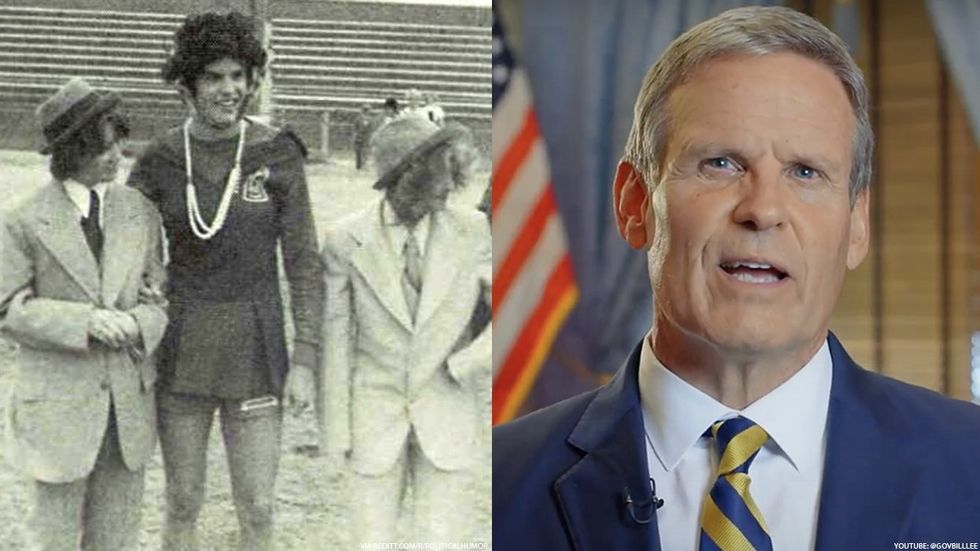The Human Rights Campaign is striking back against Tennessee Gov. Bill Lee after he signed bills into law last week that ban gender-affirming care for trans youth and restrict drag performances.
HRC is running a full-page ad in Tuesday’s edition of The Tennessean, one of the state’s largest newspapers, calling out Lee for his anti-LGBTQ+ actions while featuring the infamous picture of him posing in drag for his high school yearbook in 1977.
It will also hold a rally Thursday in Nashville against the rash of anti-LGBTQ+ laws adopted in Tennessee — 14 since 2015, the most in any state.
“Gov. Bill Lee isn’t just focused on anti-LGBTQ+ legislation — he’s obsessed with it,” HRC President Kelley Robinson said in a press release. “He’s infatuated with it. It’s why Tennessee has enacted more anti-LGBTQ+ laws than any other state since 2015, and why Gov. Lee last week became the very first governor in the country to sign a drag ban into law. Hypocrisy and discrimination run rich in the Tennessee of Gov. Lee — who himself formerly enjoyed dressing in drag but who is now working feverishly to prove otherwise.
“But what’s truly unforgivable is that Gov. Lee’s agitated focus on the LGBTQ+ community has now shamelessly targeted transgender and nonbinary youth, seeking to deny them access to age-appropriate, lifesaving gender-affirming care. This is why we took out a full-page ad in The Tennessean and why we’ll be rallying in Nashville on Thursday: Because it’s time for Gov. Lee to hear loud and clear that Tennesseans are tired of the political theater, and that discrimination and hypocrisy have no place in Tennessee.”

Lee signed both bills last Thursday. The measure on gender-affirming care, House Bill 1, bans surgery, puberty blockers, and hormone treatment for the purpose of gender transition for people under 18. It will take effect this summer. Minors currently receiving treatment will have until March 31, 2024, to end it. Those who’ve received the treatment of minors will have the right to sue their parents and guardians as well as physicians.
The anti-drag legislation, House Bill 9, redefines “male and female impersonators” as adult cabaret performers and bans “adult-oriented performances that are harmful to minors.” Drag performances could not take place on public property or in venues accessible to minors. The first violation of the law would be a misdemeanor offense, with a penalty of up to 11 months and 29 days in prison and/or a maximum fine of $2,500. A further violation would be a felony, with one to six years in prison and a fine of up to $3,000.
The yearbook picture of Lee in drag surfaced a few days before he signed the bills into law. He claimed there was no comparison between his appearance in that photo and the type of performances the anti-drag law will ban.
The list of anti-LGBTQ+ laws enacted in Tennessee since 2015 “includes two bathroom bans, three laws preventing transgender students from playing sports consistent with their gender identity, a law allowing discrimination by state contractors providing child welfare services paid for with taxpayer funds, curriculum censorship bills, and more,” HRC’s press release notes. Lee, a Republican, has been governor since 2019, and another Republican, Bill Haslam, preceded him, having been in office from 2011 to 2019.
The rally, “Slay Hate: Fight Back Tennessee,” will begin at 6:30 p.m. Thursday at Nashville LGBTQ+ bar Tribe. Robinson will be at the rally, along with Grammy nominee GAYLE, singer-songwriter and transgender rights activist Shea Diamond, Tennessee Equality Project Executive Director Chris Sanders, and representatives from the National Women’s Law Center and the American Civil Liberties Union of Tennessee. Admission is free, and more information is here.
In 2022, politicians in statehouses across the country introduced 315 anti-LGBTQ+ bills, and 29 became law. The majority of the bills – 149– targeted the transgender and nonbinary people. Less than three months into 2023, HRC is already tracking more than 400 anti-LGBTQ+ bills that have been introduced at the state level. Of those, 175 would specifically restrict the rights of transgender people, the highest number of bills targeting transgender people in a single year to date.















































































